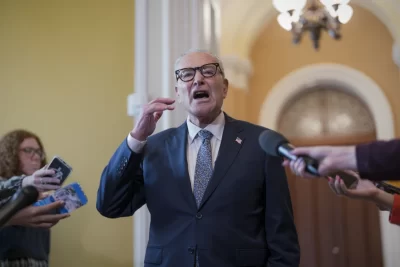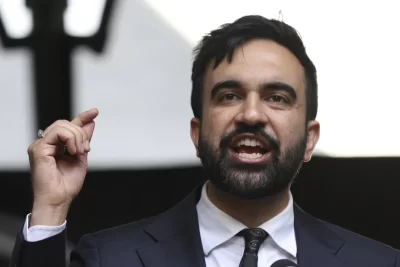
WASHINGTON — Reproductive freedom took center stage during Biden’s State of the Union address, but abortion rights advocates had mixed reactions, raising concerns about the president trying to capitalize on what will be a central campaign issue while avoiding using the word “abortion.”
Abortion rights have proved to be a potent issue driving voters to the polls and boosting Democrats since the U.S. Supreme Court ended a constitutional right to the procedure nearly two years ago. The issue could be pivotal in the presidential race and congressional contests this year.
During Thursday’s speech, Biden deviated from his prepared remarks, skipping over the word “abortion” and instead using the phrases “reproductive freedom” or “freedom to choose.”
The word was used once in his prepared remarks, when he introduced Kate Cox, first lady Jill Biden’s State of the Union guest and a Texas woman who was forced to flee the state for an abortion after finding out her fetus had a fatal condition. The text had Biden saying, “Because Texas law banned abortion.” Instead, he said “Because Texas law banned her ability to act.” It’s common for elected officials, especially Biden, to go off script or make in-the-moment tweaks for a host of reasons.
“By not saying the word ‘abortion,’ it implies that it’s taboo or something to be ashamed of,” said Kellie Copeland, executive director of Pro-Choice Ohio. “It’s stigmatizing and harmful. The president should do better.”
Amy Hagstrom Miller, president and CEO of Whole Woman’s Health, which manages abortion clinics in Maryland, Minnesota, New Mexico and Virginia, said there was an “uproar” across the organization as staff members texted their reactions to each other.
“Abortion is what we provide and what people are being denied,” she said. “People don’t call us for a reproductive freedom appointment. They don’t ask for a bodily autonomy visit or a choice procedure. They call for abortion care, and abortion is a professional medical term for the health care we provide. Avoiding the word just shows the power of the historical stigma around abortion.”
The pushback over how he addressed the issue in his State of the Union speech is the latest example of Biden’s fraught history with the topic. Many in the abortion rights movement have long viewed him as an imperfect messenger.
Biden initially opposed the 1973 Roe v. Wade decision, saying it went too far. He also opposed federal funding f or abortions and supported restrictions on abortions later in pregnancy.
The Biden campaign’s strategy is to let the president be who he is — an 81-year-old Catholic man whose views on the issue have evolved and who still doesn’t use the word abortion much. His aides also want to highlight his evolution on the issue and how he still grapples with what can be an uncomfortable topic but believes firmly in the freedom of choice.
“Donald Trump on the other hand has repeatedly used disgusting and derogatory language when referring to women, and he will institute a national abortion ban,” said Lauren Hitt, spokesperson for the Biden campaign. “The choice in this election is incredibly clear.” Trump has taken credit for appointing three Supreme Court justices who made overturning Roe v. Wade possible.
Biden’s aides believe they can reach a broader swath of voters by framing the issue around reproductive freedom, as the fallout from the Supreme Court’s decision to overturn Roe v. Wade has moved beyond access to abortion and into areas such as IVF and birth control.
The strategy might appeal to some voters but alienate others, said Sophia Jordán Wallace, a political science professor at the University of Washington.
“The question is if people sincerely believe that this framing is because he’s thinking about abortion plus other issues or whether he’s using that framing to avoid saying the word ‘abortion’ due to discomfort,” she said,. She added that Biden could be more explicit about how his perspective on abortion has changed, something many voters may be able to relate to.







